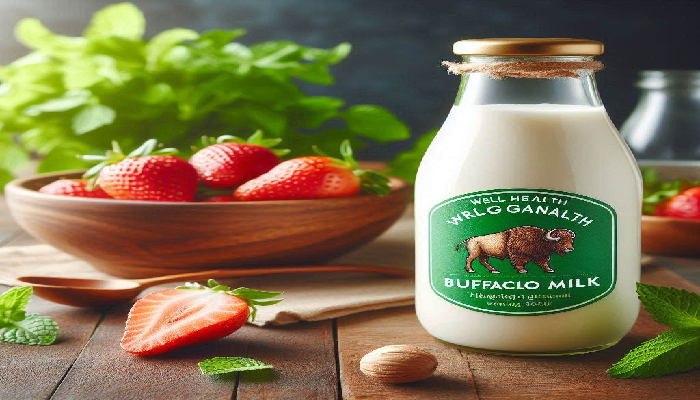The Nutritional and Health Benefits of Buffalo Milk
wellhealthorganic buffalo milk tag often overshadowed by its more commonly consumed counterpart, cow milk, is a nutritional powerhouse that has been a staple in various cultures for centuries. Renowned for its rich, creamy texture and higher fat content, buffalo milk is not only a culinary delight but also offers a multitude of health benefits. In this article, we delve into the unique attributes of buffalo milk, exploring its nutritional profile, health advantages, and its growing popularity in the organic food market.
Nutritional Profile of wellhealthorganic buffalo milk tag
wellhealthorganic buffalo milk tag boasts a superior nutritional profile compared to cow milk. It is notably higher in fat, protein, and essential vitamins and minerals. Here’s a breakdown of its key components:
- Fat Content: Buffalo milk contains about 7-8% fat, which is almost double that of cow milk. This higher fat content gives it a richer and creamier texture, making it ideal for dairy products like butter, cheese, and ice cream.
- Protein: With a protein content of around 4-5%, buffalo milk provides a robust source of essential amino acids necessary for muscle repair and growth.
- Vitamins and Minerals: Buffalo milk is rich in vitamins A and D, both of which are crucial for maintaining good vision, skin health, and bone strength. It also contains higher levels of calcium, magnesium, and phosphorus, contributing to stronger bones and teeth.
- Lactose: While buffalo milk contains lactose, the higher fat and protein content can make it easier to digest for some people compared to cow milk. However, it is not suitable for those with lactose intolerance.
Health Benefits of Buffalo Milk
The rich nutritional profile of buffalo milk translates into several health benefits, making it a valuable addition to a balanced diet:
- Improved Bone Health: The high calcium and phosphorus content in buffalo milk strengthens bones and teeth, reducing the risk of osteoporosis and dental issues.
- Enhanced Immune System: Vitamins A and D play a significant role in boosting the immune system. These vitamins help in maintaining the health of the skin and mucous membranes, which are the body’s first line of defense against pathogens.
- Heart Health: Although buffalo milk is higher in fat, it contains beneficial fats such as omega-3 fatty acids. These healthy fats help reduce bad cholesterol levels (LDL) and increase good cholesterol levels (HDL), promoting cardiovascular health.
- Energy and Satiety: The high protein and fat content in buffalo milk make it an excellent source of sustained energy. It also promotes a feeling of fullness, which can help in weight management by reducing overall calorie intake.
Buffalo Milk in the Organic Food Market
With the rising demand for organic and natural foods, buffalo milk has gained popularity among health-conscious consumers. Organic buffalo milk is produced without the use of synthetic hormones, antibiotics, or pesticides, making it a healthier choice for both individuals and the environment.
Sustainability: Buffalo farming is often more sustainable than cow farming. Buffaloes have a lower environmental impact as they produce less methane and require less feed and water compared to cows.
Culinary Uses: The creamy texture and rich flavor of buffalo milk make it a favorite in culinary applications. It is widely used in making traditional dairy products like mozzarella cheese, yogurt, and paneer. These products not only taste better but also retain more nutrients due to the higher fat and protein content of buffalo milk.
Conclusion
wellhealthorganic buffalo milk tag is a nutrient-dense alternative to cow milk, offering a range of health benefits from improved bone health to enhanced immune function. Its growing popularity in the organic food market is a testament to its nutritional value and sustainability. Whether you’re looking to add more protein to your diet, improve your cardiovascular health, or simply enjoy a richer, creamier taste in your dairy products, buffalo milk is a versatile and healthy choice.




